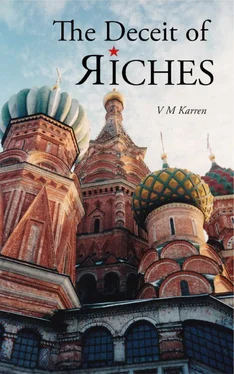“Were you wholesaling the parts for a discount?” I pushed for more details.
“We can say that I wasn’t paying the full price for my parts. You must understand, it was a confusing time. Nobody understood how to price their materials and costs into a sale price. Factories were all producing at losses, but remember it was the volume of production that mattered in the old system, not the profits. Profit was a dirty word for the industrial managers. The quota was the goal. It was for quotas that they were rewarded. If they produced and could prove it — holiday on the Black Sea for the managers. What happened to the cars and parts after that wasn’t important to anybody at the factory,” he explained justifying himself.
“Has that changed now, nine years later?” I asked not actually knowing the answer.
“Yes, as soon as the word ‘privatniy’ got known even those factory managers understood how to make profits. They made profits for themselves and not for their factories, but yes everybody understands it now. The difference between those who can and cannot make profits has to do with their position. Many people went out to find a position or a different job to make profits,” he explained with a unique inside understanding.
“How did the business model change with the political environment?” I asked again like a scientist.
“When the director at GAZ figured out what we were doing with his car parts he closed the gates and thought he could do it better than us. He tried, but it didn’t work because he didn’t have the market. We did,” he was bragging now.
“So, what did you do then?” I egged him on.
“We started importing cars in 1990 from Germany. After the Berlin Wall, we could import Mercedes, BMWs, Opels, and Volkswagens. So instead of the car parts, we would sell the whole car to the young people driving taxis and to new businessmen in Russia,” he said reminiscing a bit.
“Do you speak German?” I asked expecting him to answer in the negative.
“Yes, I had to study it in school and my father lived in East Germany for many years and we would speak German at home when nobody was listening of course. Nobody here likes Germans. He was an engineer so he helped me understand the difficult words and I sounded like I knew what I was talking about with those gypsies from Germany,” he said insulting the Turks in Germany.
“Sounds very clever!” I was starting to feel uneasy and tried to hide it by being agreeable.
“We even bought broken cars from Western Germany for parts. We would import broken cars and take them apart in our garage and make inventories. So, we started being specialists in German cars for all over Russia, not just in Nizhniy. Eventually, we were able to get our parts back from GAZ as they couldn’t get our customers to order from them and so we did both,” he added.
“Was it difficult to import in 1990 and 1991 before the Soviet Union was dissolved?” I was doing my best to sound academic and harmless by not asking deep questions about his operations.
“No, not really. If we came from Germany through Finland with our trucks with cars on them, we didn’t have much trouble. In the Soviet years, we had to pay the borders guard with cigarettes and the Colonel with a BMW so they wouldn’t make problems for us. You see, they were in the wrong positions to make profits, and so they had to do what they had to do to get by and we had to look after them. Remember that the stores were empty then. Even though the military had their own special stores for purchasing meat and vodka, the distribution system was terrible and they too would go many days without anything but cigarettes and tea at the border stations. The more cigarettes they could smoke the less they felt the hunger. We were importing with the right permissions, but they still had the guns. We had to do something to help the guards follow the law,” he said without any apology.
“How is that today? Is it easier to import or more difficult? I asked the best I could without prejudice.
“Relationships make all the difference. Like I already said, we looked after the border guards. A Colonel only changes every three years. So even when the Union dissolved the same Russian Colonel was watching the Finland border crossing for two more years. So, the changes have really been very little for importing for us. We even have Volvos now from Sweden,” he boasted.
“Do you import form other places than Europe?” I asked already knowing about his Korean connections.
“Yes, from Asia. We import electronics, mostly radios, and televisions and video tape players. Russian electronics are so poorly made that Russians won’t buy those anymore. Usually, the drunks are employed at the radio and television factories. They can’t build anything right!” he sneered.
“Did you start with radios in the same way you started with car parts?” I lead him on.
“Nyet, I had a license to import and I knew that radios and televisions from our factories were no good, so I made some connections through a taxi company I know in Vladivostok and they sent me a container filled with Korean radios and televisions. I wanted Japanese, SONY, but they were too expensive. So, we opened a shop in town and the people came and bought them so fast that we had to close the store after three days because we had nothing more to sell! Imagine that. We asked for more. And it just kept going like that for many months,” he recalled.
“How did you start importing cars from Asia? It sounds like a different dynamic than in your early days.” I asked.
“My contacts in Vladivostok were already importing Korean cars and the relationship moved from only electronics to include cars too and also spare parts. We are only importing second-hand cars. The new ones were still too expensive for the Russian taxi drivers. We are now the largest distributor of Hyundai parts on this side of the Ural mountains. The Korean and Japanese cars are all you see in Vladivostok now. They’re crazy out there,” he said holding his finger to his temple.
“From your history, I understand you are more an entrepreneur than a typical director of a factory or a farm or another organization that had experience with the new privatization process, so perhaps any questions I have about that maybe need to be for somebody else,” I said bating the hook for him.
“Da nyet, I am also involved in privatization here in Nizhniy Novgorod. In fact, I have bought and run a restaurant now that was a state-owned enterprise, several shops that sell electronics that we import from Asia and I am now investing in a number of grocery stores,” he remarked.
“OK, that’s an interesting step. Can you tell me about your experience with this process? Are you continuing the old operations with the same staff and suppliers or do you have your own network of suppliers and staff? Obviously, the imports from Korea are an additional supply chain, but do you continue to support the domestic producers?” I asked professionally.
“Understand that domestic production is so poor that nobody wants to buy it. Did you know that several people were killed in the late 1980s by exploding televisions? The circuits were so badly built that the tubes actually exploded with an overload and killed several old women. I am not joking. The people would only purchase the radios built in the second week of a month. Do you know why? Because it was the second week of the month that the managers were actually doing something to control quality. In the first week, they were still drunk or hungover from drinking their quota rewards for the month before. In the last week, they were too busy just pushing half built radios through the assembly line in order to reach quota by the end of the month. So, the women would demand the shop clerks to open the back of the radio to see the date of production, check the calendar, and then it had to be plugged in and the volume on as loud as it could go for a few minutes go before they would agree to buy it. So, do I support Russian factories? Not when gypsies, Tatars, and Kavkazi are building them in Russian factories,” he said with disgust.
Читать дальше












